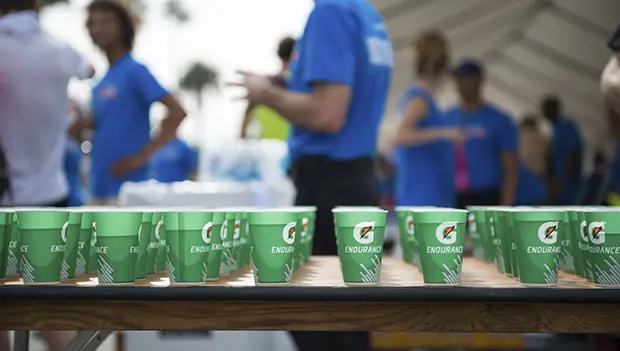
Marathon season is officially upon us, and while it's important to have a proper training schedule, it's equally important to have a proper fueling schedule. Linda Samuels, MS, RD, CSSD, LDN of Training Table Sports Nutrition based in Chicago, suggests starting your fuel regimen as early as one month prior to your big race.
"Athletes should make sure they start practicing with the fueling/hydration they plan to use on the course," says Samuels, who in addition to being board-certified in sports dietetics, is also Northwestern University's triathlon team coach. "This way, athletes can detect which products work for them as their duration gets longer."
In terms of what to fuel with, Samuels says it's a matter of preference. Runners need to ask themselves: Do they want to fuel by drinking only? Are they OK with using chews as their fuel source? Do they want the convenience of gels?
"[The energy you get from] gels typically lasts 45 minutes to an hour," Samuels says. "This becomes an issue if you're burning through carbohydrates faster, which is common during competition. I recommend small amounts of carbohydrate be taken on a consistent basis. This then makes a liquid fuel source like a sport drink a better option, or a chew and water."
More: 4 Steps to Perfect Marathon Fueling
In addition to choosing fuels, runners must know when to use them. Samuels advises checking the course stations prior to race day and making plans based off the information.
For example, if stations are located at every mile on the course and your pace is an 8-minute mile, you can practice fueling every 8 minutes by drinking a sports drink or eating a chew. If you're a 10-minute miler, practice fueling every 10 minutes. Post-practice run, athletes will be able to determine if they had too much or not enough based on how they feel.
She points out that some research shows athletes typically don't need to pay as much attention to fueling their body if their run is less than an hour. But, every body is different.
"In my experience working with athletes, the key question that they need to answer is this: Were they able to maintain the intensity of the run/workout throughout the entire run/workout? If the answer is "no," they would benefit from fueling during run/workouts," Samuels says. "An example of this is speedwork: this is a higher intensity workout, so they are burning more carbohydrates. To make sure runners have high quality runs/workouts, they need to fuel their body with carbohydrates. Paying attention to their body's energy needs is critical to building endurance and speed."



